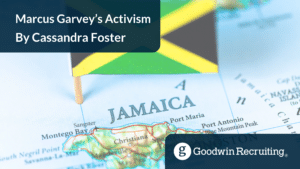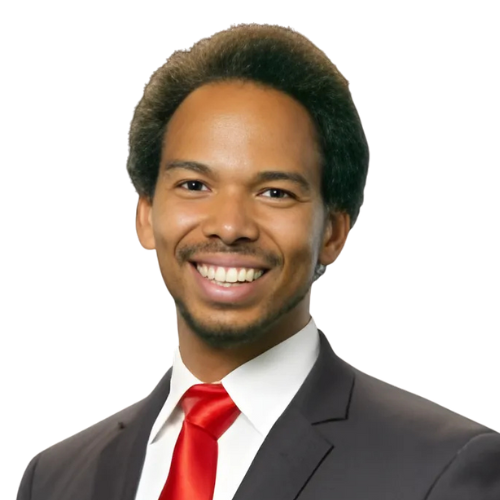
As a Jamaican-born, I grew up to know Marcus Garvey as a hero. Looking further into his work as an activist and into his ideologies, however, you’ll uncover that there are some controversies alongside his positive impacts. In this blog, I’ll dive into the impact Marcus Garvey made, and allow you to decide for yourself if Garvey’s work was controversial or indubitable.
Marcus Mosiah Garvey was a Jamaican-born Black nationalist and leader of the Pan-Africanism movement. He was born in St. Ann’s Bay, Jamaica, on August 17, 1887. Some say he was “probably the most charismatic Afro-American leader before Dr. Martin Luther King, Jr.”
In 2012, the government of Jamaica established Marcus Garvey Day – observed every August 17 – to honor the anniversary of this historical figure’s 125th birthday. While he is considered the first national hero of Jamaica, his life and legacy achieved global impact and still resonate today.
Marcus Garvey Day is celebrated by Jamaicans here in the United States as well as abroad, for Garvey’s life work in seeking to unify and connect people of African descent worldwide. In addition to being a political activist, he was a journalist, publisher, and entrepreneur who fought for the rights of Afro-Jamaicans. Among his many pursuits and accomplishments, he organized the United States’ first Black nationalist movement, urging Black Americans to be proud of their identity.
A bigger picture of his life work and achievements
At a time when European nations owned and controlled most of Africa, Asia, and the Caribbean, when racial discrimination was accepted as normal and Black people globally were legally subjected to inferior conditions at every level, Garvey’s experiences led him on a lifelong road of advocacy for racial equality and African advancement.
- Through his activism, Garvey publicly confronted and questioned the injustices of colonial Jamaican society and went on to establish what was to become the largest and most successful pan-African movement – a project driven by a vision of upliftment and economic empowerment of Africans at home and in the diaspora.
- In 1914, Garvey founded the Universal Negro Improvement Association (UNIA), which aimed to attain Black nationalism through celebrating African culture and history. Through UNIA, he promoted the “back to Africa” movement and developed the Black Star Line to serve as a Black-owned passenger and shipping line to transport people back and forth to Africa. He also encouraged the establishment of Black shopping centers and restaurants to promote economic independence. While he founded UNIA in Jamaica, its main influence was felt in principal urban Black neighborhoods of the northern United States after his arrival in Harlem in New York City in 1916.
- In 1929, Garvey founded the People’s Political Party (PPP), Jamaica’s first modern political party. Its administration vigorously worked to provide equal rights for students and employees and issued needed assistance for underprivileged people in the community.
- Garvey stressed the value of education in its broadest sense – “to be learned in all that is worth knowing. Not to be crammed with the subject matter of the book or the philosophy of the classroom, but to store away in your head such facts as you need for the daily application of life, so that you may the better in all things understand your fellowmen and interpret your relationship to your Creator.” He implored people to draw inspiration from positive aspects of the past not acknowledged by the prevailing hegemony of Eurocentric education and media establishments.
Controversial activism impacted his legacy
Several facts detail how Garvey was controversial in his activism, including being a controversial figure within the Black community. He believed in racial separation, contradicting major thoughts of Black leaders like W.E.B Du Bois, and his comments seemed to thank white supremacists for enacting Jim Crow Laws that encouraged racial segregation. This led some Black leaders and writers like Du Bois to describe him as the most dangerous enemy of the Black community in America and globally.
In 1922, Garvey was charged with mail fraud in connection with a ship on the Black Star Line. He was found guilty and sentenced to a two-year jail term at the Atlanta Federal Penitentiary. Negative press and complaints from stockholders gave him a reputation as a swindler.
Garvey’s decision to develop partnerships and connections with white supremacists damaged his inspired mission and reputation of uplifting the lives of African American individuals and all individuals of African descent. At the same time, his relentless opposition to white dominance alarmed white Americans and assimilationist Black leaders. Consequently, this left Garvey without support from mainstream civil rights activists, even though he had massive civil rights movement followers and revolutionary ideas.
Garvey’s actions are still relevant
Declaring August 17 as Marcus Garvey Day in Jamaica was considered appropriate, being the anniversary of his birth, to focus attention each year on his outstanding contributions to national advancement. His legacy and actions continue to instill inspiration and pride in many Black persons and in many ways across the globe. Garvey impacted current and future generations by promoting Pan-Africanism, Black nationalism, and his focus on the Black community’s economic independence.
Garvey’s ideology has influenced members of the Rastafari movement, the Nation of Islam, and the Black Power movement, and more recent leaders, such as Malcolm X, Martin Luther King Jr., and Kwame Nkrumah, were inspired by his teachings. Garvey’s philosophy, called Garveyism, continues to promote a better future for individuals of African descent worldwide.
As I mentioned earlier – some may view Garvey’s work as controversial, others as indubitable. You decide for yourself – but regardless, it’s safe to say his activism certainly left an imprint on our world today.
Share This Article














































